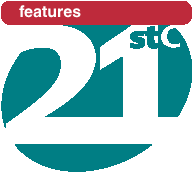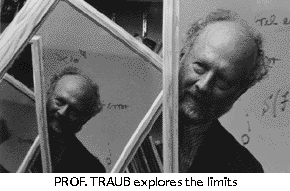

P U S H I N G T H E E N V E L O P E
A paradigm is born
A computer scientist at Columbia tries to create
a "meta-paradigm" focusing on the limits of
scientific knowledge. In other words, can we know
what is possible-and impossible-for us to know?
By JOHN HORGAN
IN HIS 1962 BOOK, The Structure of Scientific Revolutions, the philosopher Thomas Kuhn defined the term "paradigm" as a set of assumptions and procedures that instructs scientists how to conduct their research and even how to think. Although discussions of Kuhn's term often focus on the restrictive aspects of paradigms, Kuhn himself emphasized that paradigms enable scientists to define problems precisely enough that they can be solved. Fields lacking a dominant paradigm, Kuhn pointed out, often seem to make little or no progress.
 At the moment, a number of scientists, philosophers, and mathematicians
are seeking to create a new paradigm, one with an oddly self-referential
slant. They hope to create a field in which science, by turning its cold
eye on itself, can delineate its own limits. One of the leaders of this
effort is Joseph F. Traub, Edwin Howard Armstrong Professor of Computer
Science at Columbia. He has written a number of papers and organized several
meetings on the topic that he sometimes refers to as WISK, for "What
is scientifically knowable?"
At the moment, a number of scientists, philosophers, and mathematicians
are seeking to create a new paradigm, one with an oddly self-referential
slant. They hope to create a field in which science, by turning its cold
eye on itself, can delineate its own limits. One of the leaders of this
effort is Joseph F. Traub, Edwin Howard Armstrong Professor of Computer
Science at Columbia. He has written a number of papers and organized several
meetings on the topic that he sometimes refers to as WISK, for "What
is scientifically knowable?"
The goal of WISK studies, Traub explains, is to apply the scientific method to questions that in the past have been considered primarily by philosophers, from Kant to Kuhn himself. Traub acknowledges that the nascent enterprise is still searching for its unifying paradigm. But that, he says, is what makes it so exciting. "It's a whole new area, and we don't know how to do it," he remarks. "How do we move this kind of inquiry from epistemology and philosophy into science?"
Traub is confident the field will eventually bear fruit, given the history of similar endeavors in mathematics and computer science-endeavors to which Traub has contributed. In 1931, Traub recalls, the mathematician Kurt Gödel proved that any system of axioms as complicated as arithmetic or more so is "incomplete." (An axiom is a statement that is assumed to be true without proof.) That is, the system generates statements that cannot be proved with the axioms. In order to prove these statements, one must add more axioms to the system.
Far from discouraging mathematicians from practicing their craft, Traub says, Gödel's theorem showed that mathematics was capable of making rigorous statements about its own foundations. Closely related developments have unfolded in computer science. In the mid-1950s the British mathematician Alan Turing demonstrated that certain computational problems are "undecidable"; that is, one cannot tell in advance whether a computer will eventually solve the problem or continue chugging away forever without ever yielding an answer.
Since then, Traub notes, he and other computer scientists have extended Turing's work by creating a discipline, called computational complexity, that categorizes problems according to their difficulty, or complexity. Researchers have shown that even if a problem is, in principle, decidable, the sun might burn out before all the world's computers together can solve it. Such problems are said to be computationally intractable.
One famous conundrum thought to be intractable is the traveling salesman problem. The salesman wants to visit a certain number of cities while minimizing the mileage he puts on his car. It is widely believed, though not yet proved, that the complexity of this problem surges exponentially as the number of cities increases.
In 1959, Traub started his pioneering work on a branch of computational complexity called information-based complexity. He has collaborated on this work with another professor of computer science at Columbia, Henry Wozniakowski. Information-based complexity focuses on a wide range of problems whose variables can assume a continuous range of values. (Temperature is an example of a continuous variable; the number of cities in the traveling salesman problem, in contrast, is always a whole number.)
The computational complexity of most problems of this kind grows exponentially with the number of variables, Traub says. But some of the problems become tractable if one is willing to settle for a probabilistic answer in lieu of absolute certainty. Information-based complexity, Traub comments, now has a well-defined set of assumptions and procedures-in short, a paradigm-for guiding further research.
In the mid-1980s, Traub began to wonder whether scientists can prove that there are limits to science's ability to answer certain questions, just as Gödel and Turing proved that there will always be unanswerable questions in mathematics and computer science. He first talked about WISK in a University Lecture at Columbia's Low Rotunda in 1985.
Traub's ruminations soon brought him into contact with a much larger community of researchers studying complex problems not just in computer science and mathematics but also in biology, physics, and the social sciences. Many of these scientists are associated with the Santa Fe Institute, a small but high-powered non-profit institution that fosters interdisciplinary research.
Traub, who was recently appointed external professor at the institute, found that his colleagues were often wrestling, consciously or not, with questions about the limits of science. In the spring of 1994, he co-organized a workshop there on "The Limits of Scientific Knowledge"; at this meeting, a score or so of physicists, biologists, economists, and others debated whether there are any boundaries to their disciplines.
"Can we prove that there are unanswerable questions in science, that is, limits to scientific knowledge?" Traub asked at the workshop. "A key word in that sentence is 'prove.' Can we turn philosophical inquiry into proof?" Traub offered several examples of such inquiries: When will the universe stop expanding? How do babies learn a language? What will be the average world temperature in 2001?
"People tend to assume a particular model" for these questions, Traub noted, "and to discuss undecidability and intractability for that model." But proving that a given question is beyond science's grasp, he said, may require demonstrating undecidability or intractability for "all possible mathematical models that capture the essence of a scientific question" rather than a specific model.
Traub is organizing two more workshops to be convened in Santa Fe. One on physics will be held in the spring of 1996, and another on economics is scheduled for the summer. The goal of the meetings, Traub says, is to "jump-start the study of scientific limits by attracting a critical mass of top researchers."
Could science grind to a halt?
SOME PARTICIPANTS IN the discussions of WISK have expressed concern that it might be used to criticize science or to discourage scientists from attempting to make further progress; after all, Thomas Kuhn's views have been adopted by many critics of science. Traub, pointing to the rich results stemming from the work of Gödel and Turing, rejects this scenario. "My feeling is that this is an enrichment of science," he says. "It is not defeatism at all." Traub admits he is pessimistic about many aspects of modern civilization but not about science. "Science is where much of the intellectual action of the 20th century takes place," he says.
One scientist who doubts whether limitology can ever generate a truly rigorous paradigm is Gunther Stent, a biologist at the University of California at Berkeley. Stent, who founded the first department dedicated to molecular biology in the 1960s, certainly believes there are limits to science. In his book The Coming of the Golden Age: A View of the End of Progress, published in 1969, he asserted that science would one day grind to a halt as it confronted insurmountable physical, economic, and even cognitive limits.
According to evolutionary theory, Stent explains, natural selection endowed us with a limited number of instinctive concepts for coping with the world. Stent believes that science, and physics in particular, has already begun to outrun our "Darwinian epistemology"; after all, neither Einstein's theory of general relativity, with its pliable space and time, nor quantum mechanics, which depicts electrons as both waves and particles, "make sense" in ordinary terms. Stent thus contends that a complete understanding of the universe's origin or of human consciousness may forever remain beyond our cognitive grasp.
But proving that a given scientific problem is unsolvable, Stent remarks, is another matter. In the early 1950s, he recalls, a prominent physicist "proved" that only rockets powered by atomic energy could break free of the earth's gravitational field. "Of course they were wrong," Stent adds with a chuckle. (The physicist had made his prediction when electronic devices still depended on bulky, heavy vacuum tubes rather than transistors.)
Stent's prognosis is too pessimistic, according to Patrick Suppes, a philosopher at Stanford. He points out that scientists have already discovered some important limits to their ability to describe nature. Heisenberg's uncertainty principle, for example, decrees that a physicist can never pinpoint both a particle's position and its momentum at the same time. The field known as chaos has established that even without quantum indeterminacy, many phenomena would be intrinsically unpredictable; arbitrarily minute perturbations can have enormous and utterly unforeseeable consequences.
If scientists have not proceeded further in establishing what is knowable or unknowable, Suppes says, that may simply be because they have been too busy discovering new phenomena. "The limits of knowledge has been in many ways more a topic of philosophy or mathematics," Suppes says. "What is a new twist here is to try to consider limits in terms of science more directly." Suppes suspects that in order to prove certain questions are unanswerable, scientists might have to pose those questions in a mathematically formal way. "It certainly seems feasible to do it," he adds.
Most scientists are fortunate to participate in the creation of one paradigm. Traub-if WISK follows the same course that information-based complexity did-will have been involved in establishing two. "I feel blessed," he says. "But I have always tried to create new areas."
In a sense, researchers studying WISK are trying to construct what might be called a meta-paradigm, one that can help reveal the capabilities and constraints of other, more focused paradigms. Such a meta-paradigm, if it takes hold, might help scientists invest their time and resources more wisely. It might even allow us to know what we cannot know. As the Danish physicist and poet Piet Hein once wrote, "Knowing what/thou knowest not/is, in a sense,/omniscience."
JOHN HORGAN, a senior writer for Scientific American, is a graduate of the Columbia School of General Studies and of the Columbia Graduate School of Journalism. His book The End of Science: Facing the Limits of Science in the Twilight of the Scientific Age will be published by Addison-Wesley in May 1996.
PHOTOS: Lena Lakoma




